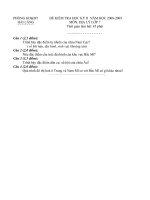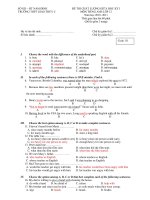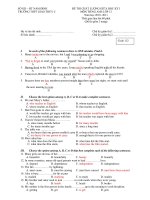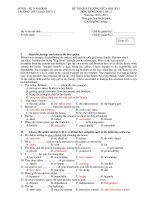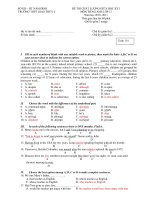đề thi vad đáp án học kỳ i môn tiếng anh 20202021
Bạn đang xem bản rút gọn của tài liệu. Xem và tải ngay bản đầy đủ của tài liệu tại đây (128.42 KB, 5 trang )
<span class='text_page_counter'>(1)</span><div class='page_container' data-page=1>
<b>SỞ GIÁO DỤC VÀ ĐÀO TẠO AN GIANG</b>
ĐỀ CHÍNH THỨC
<i>(Đề có 05 trang)</i>
<b>ĐỀ KIỂM TRA CUỐI KỲ I – NĂM HỌC: 2020-2021</b>
<b>Môn: Tiếng Anh - Khối 12</b>
<i>Thời gian làm bài: 60 phút, không kể thời gian phát đề.</i>
<b>Họ và tên thí sinh: ...</b>
<b>Số báo danh: ...</b>
<i><b>Mark the letter A,B,C, or D on your answer sheet to indicate the word that differs from the other three </b></i>
<i><b>in pronunciation in each of the following questions.</b></i>
<b>Question 1: A. moved</b> <b>B. enjoyed</b> <b>C. liked</b> <b>D. achieved </b>
<b>Question 2: A. fashion</b> <b>B. signal </b> <b>C. contact </b> <b>D. attract</b>
<i><b>Mark the letter A, B, C, or D on your answer sheet to indicate the word whose underlined part differs</b></i>
<i><b>from the other three in pronunciation in each of the following questions.</b></i>
<b>Question 3: A. broaden</b> B. enter C. travel D. absord
<b>Question 4: A. persistent </b> B. dynamic C. sensitive D. ambitious
<i><b>Mark the letter A, B, C, or D on your answer sheet to indicate the correct answer to each of the</b></i>
<i><b>following questions.</b></i>
<b>Question 5: I can't go with you because I ________my homework yet.</b>
A. hadn’t finished B. haven't finished C.didn’t finish D. don’t finish
<b>Question 6: Hoa hoped that she _________ to join the club. She could make friends with many people</b>
here.
A. invited B. invites C. would be invited D. was inviting
<b>Question 7: The government suggests_________robots to access remote areas that are dangerous to the</b>
lives of militants.
A. designing B. designed C. to design D. design
<b>Question 8: If the weather is fine this weekend, we _________ to see our grandparents.</b>
A. were going B. will go C. would do D. went
<b>Question 9: She will take the management training course _________.</b>
A. right after the epidemic has been controlled B. as soon as the epidemic was controlled
C. when the epidemic had been controlled D. until the epidemic will be controlled
<b>Question 10: It is said the Robinhood robbed _________ rich and gave the money to the poor.</b>
A. an B. a C. the D. no article
<b>Question 11: Your mother sometimes buys you a big present, _________?</b>
A. does she B. doesn’t she C. isn’t she D. didn’t she
<b>Question 12: She’s expected to be accustomed _________living in the country.</b>
A. in B. to C. at D. for
<b>Question 13: The patients _________ with the new drug showed better signs of recovery than those</b>
receiving conventional medicine.
A. treated B. having treated C. treating D. who treated
<b>Question 14: Although David was _________after a day’s work in the office, he tried to help his wife </b>
with the household chores.
A. exhaust B. exhaustively C. exhaustion D. exhausted
<b>Question 15: A lot of things went wrong _________we had planned everything carefully.</b>
A. because B. although C. despite D. because of
<b>Question 16: Do you often __________ your younger brother when your parents go out?</b>
A. look after B. turn up C. take after D. go off
<b>Question 17: In my company, the deputy director usually _________ the responsibility for organizing</b>
meetings and conferences.
A. makes B. pays C. becomes D. takes
</div>
<span class='text_page_counter'>(2)</span><div class='page_container' data-page=2>
<b>Question 18: Whistling or clapping hands to get someone’s attention is considered _________ and even</b>
rude in some circumstances.
A. suitable B. sociable C. appropriate D. impolite
<b>Question 19: Action movies may have a negative _________ on children. They tend to be more violent </b>
after watching action movies.
A. opinion B. influence C. dependence D. decision
<i><b>Mark the letter A, B, C, or D on your answer sheet to indicate the word(s) OPPOSITE in meaning to</b></i>
<i><b>the underlined word(s) in each of the following questions. </b></i>
<b>Question 20: This will be the last opportunity this year for the two clubs' supporters to view their teams.</b>
A. sponsors B. opponents C. fans D. players
<b>Question 21: His behaviour was seen as another act of refusal to obey. </b>
A. obedience B. disobedience C. impoliteness D. failure
<i><b>Mark the letter A, B, C, or D on your answer sheet to indicate the word(s) CLOSEST in meaning to the</b></i>
<i><b>underlined word(s) in each of the following questions.</b></i>
<b>Question 22: When you hurt someone unintentionally, you should say “sorry” to him or her in any way.</b>
A. advise B. persuade C. respect D. apoligize
<b>Question 23: I’m sorry I can’t go to the movies with you this weekend - I’m up to my ears in work.</b>
A. very busy B. very bored C. very scared D. very idle
<i><b>Mark the letter A, B, C, or D on your answer sheet to indicate the most suitable response to complete</b></i>
<i><b>each of the following exchanges.</b></i>
<b>Question 24: Mr. George is having a date with Ms. Rose at his house.</b>
<b>- Mr. George: “That’s a very nice skirt you’re wearing.”</b>
- Ms. Rose: “_________”
A. Thank you for your compliment! B. That’s all right.
C. Yes, it will D. You are welcome.
<b>Question 25: Two friends are talking about the benefits of swimming .</b>
- Daisy: “As far as I know, swimming is a really helpful thing for everyone to improve their
health.”
- Mark: “_________.”
A. That sounds great. B. I couldn't agree with you more.
C. Take part in this summer. D. That's fine for me.
<i><b>Read the following passage and mark the letter A, B, C, or D on your answer sheet to indicate</b></i>
<i><b>the correct word or phrase that best fits each of the numbered blanks</b></i>
<b>Clothing habits are a matter of personal preference in the United States. Most people are free to</b>
wear whatever they feel comfortable. Business people in large urban areas are likely to wear suits or
dresses, while clothing in rural areas is less (26)_________ .Most Americans tend to dress casually when
they are not in formal or business situations.
<b>When eating, most Americans hold a fork in the hand (27)_________ they write with. Americans</b>
eat away from home often, and usually they pay their own meals when dining with friends. When
Americans greet one another they often exchange a firm handshake. They may greet strangers on the
<b>street by (28)_________ "Hello" or "Good morning". Friends often greet each other with "How are</b>
you?" and (29) _________ "Fine, thanks." Americans do not really give any other answer to the question
"How are you?" (30)_________ it is a way of greeting. Except in formal situations, people address each
other by their given names once they are acquainted.
</div>
<span class='text_page_counter'>(3)</span><div class='page_container' data-page=3>
<i><b>Read the following passage and mark the letter A, B, C, or D on your answer sheet to indicate</b></i>
<i><b>the correct answer to each of the questions</b></i>
Body language is a vital form of communication. In fact, it is believed that the various forms of
body language contribute about 70 percent to our comprehension. It is important to note, however, that
body language varies in different cultures. Take for example, eye movement. In the USA a child is
expected to look directly at a parent or teacher who is scolding him/her. In other cultures the opposite is
true. Looking directly at a teacher or parent in such a situation is considered a sign of disrespect.
Another form of body language that is used differently, depending on the culture, is distance. In
North America people don't generally stand as close to each other as in South America. Two North
Americans who don't know each other well will keep a distance of four feet between them, whereas South
Americans in the same situation will stand two to three feet apart. North Americans will stand closer than
<b>two feet apart only if they are having a confidential conversation or if there is intimacy between them.</b>
Gestures are often used to communicate. We point a finger, raise an eyebrow, wave an arm – or
move any other part of the body – to show what we want to say. However, this does not mean that people
all over the world use the same gestures to express the same meanings. Very often we find that the same
gestures can communicate different meanings, depending on the country. An example of a gesture that
<b>could be misinterpreted is sticking out the tongue. In many cultures it is a sign of making a mistake, but</b>
<b>in some places it communicates ridicule.</b>
The dangers of misunderstanding one another are great. Obviously, it is not enough to learn the
language of another culture. You must also learn its non-verbal signals if you want to communicate
successfully.
<b>Question 31: What is the passage mainly about?</b>
A. Misunderstandings in communication
B. Interpretations of gestures in different cultures
C. The significance of non-verbal signals in America
D. Non-verbal communication across cultures
<b>Question 32: The word "misinterpreted" in paragraph 3 is closest in meaning to _________.</b>
A. mispronounced B. misbehaved C. misspelled D. misunderstood
<b>Question 33: The word "it" in paragraph 3 refers to _________.</b>
A. the country B. an example
C. sticking out the tongue D. making a mistake
<b>Question 34: As stated in the passage, in order to communicate successfully with people from another</b>
culture, it is advisable for a person __________.
A. to use the body language of the people from that culture
B. to learn both the language and non-verbal signals of that culture
C. to learn only non-verbal signals of that culture
D. to travel to as many countries as possible
<b>Question 35: Which form of body language is NOT mentioned in the passage?</b>
A. distance B. posture C. gesture D. eye movement
<i><b>Read the following passage and mark the letter A, B, C, or D on your answer sheet to indicate</b></i>
<i><b>the correct answer to each of the questions</b></i>
</div>
<span class='text_page_counter'>(4)</span><div class='page_container' data-page=4>
Homeschooling is not a novel idea. In fact, the idea of sending children to spend most of their day
away from home at a formal school is a relatively new custom. In the United States, for example, it was
not until the latter part of the nineteenth century that state governments began making school attendance
<b>compulsory. Before that, the concept of a formal education was not so widespread. Children learned the</b>
skills they would need for adult life at home from tutors or their parents, through formal instruction or by
working side by side with the adults of the family.
In the modern developed world, where the vast majority of children attend school, families choose
homeschooling for a variety of reasons. For people who live in remote areas, such as the Australian
outback or the Alaskan Wilderness, homeschooling may be their only option. Children who have
exceptional talents in the arts or other areas may be homeschooled so that they have more time to devote
to their special interests. Much of the homeschooling movement is made up of families who, for various
reasons, are dissatisfied with the schools available to them. They may have a differing educational
philosophy, they may be concerned about the safety of the school environment, or they may feel that the
local schools cannot adequately address their children's educational needs. Although most families
continue to choose a traditional classroom education for their children, homeschooling as an alternative
educational option is becoming more popular.
<b>Question 36: Which of the following could be the main idea of the passage?</b>
A. A new form of school: Homeschooling
B. Homeschooling option: a common form of education all over the world.
C. The reasons why children should be educated at home.
D. The origin of homeschooling.
<b>Question 37: What does the word “that” in paragraph 2 refer to?</b>
A. the second half of the 19th century B. the beginning of the 19th century
C. the former part of the 19th century D. the end of the 19th century
<b>Question 38: The word "widespread" in paragraph 2 mostly means _________.</b>
A. uncommon B. customary C. exceptional D. prevalent
<b>Question 39: According to the passage, the following are true about the homeschooling, EXCEPT</b>
_________.
A. Many families in both developed and developing countries choose to educate their children at
home.
B. Parents or tutors were the ones who taught the children necessary skills in society.
C. People got familiar with school attendance before choosing to learn at home.
D. Before modern times, most students did not attend the school.
<b>Question 40: As mentioned in the last paragraph, children in rural areas _________.</b>
A. have no choice but stay at home to learn.
B. prefer to improve their extraordinary interests.
C. are not contented with the philosophy of the schools available.
D. believe that their needs to study is more than what a normal school can provide.
<b>Question 41: It can be inferred from the last passage that _________.</b>
A. parents’ satisfaction plays an important role in the number of students attending class.
B. teachers’ qualifications may be one of the reasons why students come to school.
C. not many children in modern society are allowed to be educated at home.
D. some schools are unable to provide a safe environment for their students.
<i><b>Question 42: What does the author mean in the sentence: Although most families continue to choose</b></i>
<i>a traditional classroom education for their children, homeschooling as an alternative educational option</i>
<i>is becoming more popular.?</i>
</div>
<span class='text_page_counter'>(5)</span><div class='page_container' data-page=5>
<i><b>Mark the letter A, B, C, or D on your answer sheet to indicate the underlined part that needs</b></i>
<i><b>correction in each of the following questions.</b></i>
<b>Question 43: The number of students attending universities to study economics have increased steadily</b>
A B C D
in the last few years.
<b>Question 44: For thousands of years, man has created sweet-smelling substances from wood, herbs, and </b>
A B
<b>flowers and using them for perfume or medicine.</b>
C D
<b>Question 45: Food prices have raised so rapidly in the past few months that some families have been </b>
A B C
<b>forced to alter their eating habits.</b>
D
<i><b>Mark the letter A,B,C or D on your answer sheet to indicate the sentence that is closest in meaning to</b></i>
<i><b>each of the following sentences. </b></i>
<b>Question 46: My mother started working as a teacher of Math when she was 22 years old.</b>
A. My mother has been working as a teacher of Math at the age of 22.
B. My mother has been working with a teacher of Math since the age of 22.
C. My mother has been working as a teacher of Math since she was 22 years old.
D. My mother has been working as a teacher of Math when she was 22 years old.
<b>Question 47: “What did you do last night?” the policeman asked the woman. </b>
A. The policeman asked the woman what did she do the night before.
B. The policeman asked the woman what she had done the night before.
C. The policeman asked the woman what had she done the night before.
D. The policeman asked the woman what she did the night before.
<b>Question 48: It’s a pity that you didn’t tell us about this.</b>
A. I wish you told us about this. B. I wish you would tell us about this
C. I wish you had told us about this D. I wish you have told us about this
<i><b>Mark the letter A,B,C or D on your anser sheet to indicate the sentence that best combines each pair of</b></i>
<i><b>sentences in the following sentences</b></i>
<b>Question 49: The chidren were playing football in the schoolyard. They were my students.</b>
A. The chidren whom were playing football in the schoolyard were my students.
B. The chidren playing football in the schoolyard were my students.
C. The children who they were my students were playing in the schoolyard.
D. The children that they were my students were playing in the schoolyard.
<b>Question 50: His friends supported and encouraged him. He did really well in the competition. </b>
A. If his friends had given him support and encouragement, he could have done really well in the
competition.
B. No matter how much his friends supported and encouraged him, he couldn't do well in the
competition.
C. Such were his friends' support and encouragement that he couldn't do really well in the
competition.
</div>
<!--links-->

